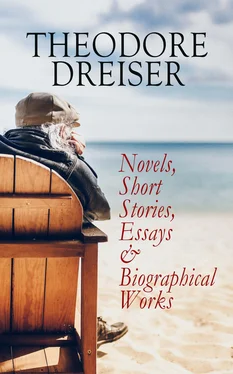“How would Wheeler do?”
“That’s all right,” said Carrie.
“Well, then, Wheeler,” he said. “I’ll get the license this afternoon.”
They were married by a Baptist minister, the first divine they found convenient.
At last the Chicago firm answered. It was by Mr. Moy’s dictation. He was astonished that Hurstwood had done this; very sorry that it had come about as it had. If the money were returned, they would not trouble to prosecute him, as they really bore him no ill-will. As for his returning, or their restoring him to his former position, they had not quite decided what the effect of it would be. They would think it over and correspond with him later, possibly, after a little time, and so on.
The sum and substance of it was that there was no hope, and they wanted the money with the least trouble possible. Hurstwood read his doom. He decided to pay $9,500 to the agent whom they said they would send, keeping $1,300 for his own use. He telegraphed his acquiescence, explained to the representative who called at the hotel the same day, took a certificate of payment, and told Carrie to pack her trunk. He was slightly depressed over this newest move at the time he began to make it, but eventually restored himself. He feared that even yet he might be seized and taken back, so he tried to conceal his movements, but it was scarcely possible. He ordered Carrie’s trunk sent to the depot, where he had it sent by express to New York. No one seemed to be observing him, but he left at night. He was greatly agitated lest at the first station across the border or at the depot in New York there should be waiting for him an officer of the law.
Carrie, ignorant of his theft and his fears, enjoyed the entry into the latter city in the morning. The round green hills sentinelling the broad, expansive bosom of the Hudson held her attention by their beauty as the train followed the line of the stream. She had heard of the Hudson River, the great city of New York, and now she looked out, filling her mind with the wonder of it.
As the train turned east at Spuyten Duyvil and followed the east bank of the Harlem River, Hurstwood nervously called her attention to the fact that they were on the edge of the city. After her experience with Chicago, she expected long lines of cars – a great highway of tracks – and noted the difference. The sight of a few boats in the Harlem and more in the East River tickled her young heart. It was the first sign of the great sea. Next came a plain street with five-story brick flats, and then the train plunged into the tunnel.
“Grand Central Station!” called the trainman, as, after a few minutes of darkness and smoke, daylight reappeared. Hurstwood arose and gathered up his small grip. He was screwed up to the highest tension. With Carrie he waited at the door and then dismounted. No one approached him, but he glanced furtively to and fro as he made for the street entrance. So excited was he that he forgot all about Carrie, who fell behind, wondering at his self-absorption. As he passed through the depot proper the strain reached its climax and began to wane. All at once he was on the sidewalk, and none but cabmen hailed him. He heaved a great breath and turned, remembering Carrie.
“I thought you were going to run off and leave me,” she said.
“I was trying to remember which car takes us to the Gilsey,” he answered.
Carrie hardly heard him, so interested was she in the busy scene.
“How large is New York?” she asked.
“Oh a million or more,” said Hurstwood.
He looked around and hailed a cab, but he did so in a changed way.
For the first time in years the thought that he must count these little expenses flashed through his mind. It was a disagreeable thing.
He decided he would lose no time living in hotels but would rent a flat. Accordingly he told Carrie, and she agreed.
“We’ll look today, if you want to,” she said.
Suddenly he thought of his experience in Montreal. At the more important hotels he would be certain to meet Chicagoans whom he knew. He stood up and spoke to the driver.
“Take me to the Belford,” he said, knowing it to be less frequented by those whom he knew. Then he sat down.
“Where is the residence part?” asked Carrie, who did not take the tall five-story walls on either hand to be the abodes of families.
“Everywhere,” said Hurstwood, who knew the city fairly well. “There are no lawns in New York. All these are houses.”
“Well, then, I don’t like it,” said Carrie, who was coming to have a few opinions of her own.
Chapter XXX
The Kingdom of Greatness – The Pilgrim a Dream
Whatever a man like Hurstwood could be in Chicago, it is very evident that he would be but an inconspicuous drop in an ocean like New York. In Chicago, whose population still ranged about 500,000, millionaires were not numerous. The rich had not become so conspicuously rich as to drown all moderate incomes in obscurity. The attention of the inhabitants was not so distracted by local celebrities in the dramatic, artistic, social, and religious fields as to shut the well-positioned man from view. In Chicago the two roads to distinction were politics and trade. In New York the roads were any one of a half-hundred, and each had been diligently pursued by hundreds, so that celebrities were numerous. The sea was already full of whales. A common fish must needs disappear wholly from view – remain unseen. In other words, Hurstwood was nothing.
There is a more subtle result of such a situation as this, which, though not always taken into account, produces the tragedies of the world. The great create an atmosphere which reacts badly upon the small. This atmosphere is easily and quickly felt. Walk among the magnificent residences, the splendid equipages, the gilded shops, restaurants, resorts of all kinds; scent the flowers, the silks, the wines; drink of the laughter springing from the soul of luxurious content, of the glances which gleam like light from defiant spears; feel the quality of the smiles which cut like glistening swords and of strides born of place, and you shall know of what is the atmosphere of the high and mighty. Little use to argue that of such is not the kingdom of greatness, but so long as the world is attracted by this and the human heart views this as the one desirable realm which it must attain, so long, to that heart, will this remain the realm of greatness. So long, also, will the atmosphere of this realm work its desperate results in the soul of man. It is like a chemical reagent. One day of it, like one drop of the other, will so affect and discolour the views, the aims, the desire of the mind, that it will thereafter remain forever dyed. A day of it to the untried mind is like opium to the untried body. A craving is set up which, if gratified, shall eternally result in dreams and death. Aye! dreams unfulfilled – gnawing, luring, idle phantoms which beckon and lead, beckon and lead, until death and dissolution dissolve their power and restore us blind to nature’s heart.
A man of Hurstwood’s age and temperament is not subject to the illusions and burning desires of youth, but neither has he the strength of hope which gushes as a fountain in the heart of youth. Such an atmosphere could not incite in him the cravings of a boy of eighteen, but in so far as they were excited, the lack of hope made them proportionately bitter. He could not fail to notice the signs of affluence and luxury on every hand. He had been to New York before and knew the resources of its folly. In part it was an awesome place to him, for here gathered all that he most respected on this earth – wealth, place, and fame. The majority of the celebrities with whom he had tipped glasses in his day as manager hailed from this self-centred and populous spot. The most inviting stories of pleasure and luxury had been told of places and individuals here. He knew it to be true that unconsciously he was brushing elbows with fortune the livelong day; that a hundred or five hundred thousand gave no one the privilege of living more than comfortably in so wealthy a place. Fashion and pomp required more ample sums, so that the poor man was nowhere. All this he realised, now quite sharply, as he faced the city, cut off from his friends, despoiled of his modest fortune, and even his name, and forced to begin the battle for place and comfort all over again. He was not old, but he was not so dull but that he could feel he soon would be. Of a sudden, then, this show of fine clothes, place, and power took on peculiar significance. It was emphasised by contrast with his own distressing state.
Читать дальше












